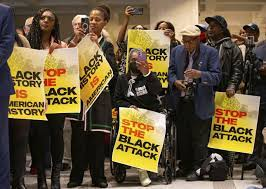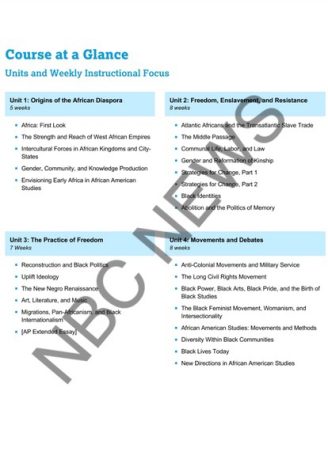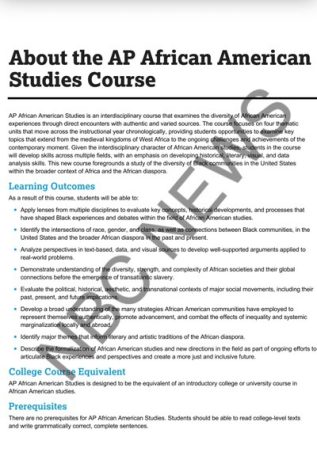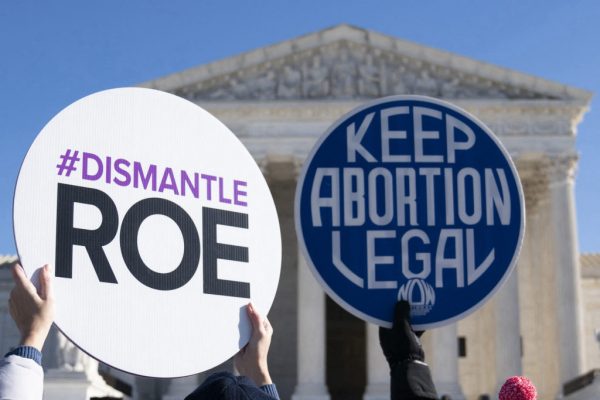The Rejection of AP African American Studies
Very recently Florida has been in uproar because of the rejection of the AP African American Studies class. DeSantis rejected the class on the claims that it teaches critical race theory and that it has sections dedicated to BLM and the black queer experience. Many are outraged by the decision Florida has made recently concerning such a sensitive matter. The Blue and White have interviewed several teachers and students for their opinion on the matter.
The Blue and White interviewed Mr. Peters who teaches AP United States History. During an interview with NBC,

DeSantis explained the course was inexplicably contrary to Florida Law. We asked Mr. Peters what he thinks about this, and he answered, “I think the curriculum is fine as all views should be explored academically. This rejection of the academic curriculum is nothing more than abuse of power by a governor with an immediate agenda.” Many are opposed to the decision, and they all agree that not teaching history is terrible for the future generation. Mr. Peters also made this conclusion, “The teaching of history is paramount for perspective, cultural understanding, and avoiding the mistakes of the past.” The African American race has seen lots of conflict and struggle in their history, and many students want to learn of it. Mr. Peters is firm in the belief that this will not be the final decision towards the teaching of this course. “It is but a temporary setback because there is nothing more powerful than an idea whose time has come.”
In accordance with Mr. Peters, Mr. Blevins, who teaches AP Capstone, also thinks that the decision made by DeSantis is an abuse of power. To reiterate, many of the ideas present in the AP course have been dubbed controversial. “That any AP course ‘teaches’ a student to believe one way or the other is a gross oversimplification.

What is wrong about teaching a student to ‘consider’ opposing viewpoints? I would proffer that this is foundational to the future problem solver”, Mr. Blevins says. Many current classes also teach what could be considered controversial ideas. To many, this class could be the key to smoothing racial conflict in the future. Mr. Blevins explains, “Opening the minds of a new generation of students to new and creative ways to solve our shameful history of race relations is essential to continue the long term healing that frank discussion and constructive debate can put forth. Course material of this nature is fuel for the fire.” One takes a class to learn information about that particular subject; the students who learn this material will be students who can be critical thinkers. In the art of teaching, a teacher must be able to teach their students concepts or difficult lessons to comprehend. Mr. Blevins has a strong opinion on that matter, saying, “I’m gobsmacked by the idea that we are incapable of leading students through controversial subject matter, no matter our political predisposition. This is Fahrenheit 451 Redux. I can refer to and speak about communism without being a communist. I can advocate for the LGBTQ community when I’m not a member. Most importantly, I can introduce controversial thinking and ‘theories’ without adopting them–Critical Race, Queer and any other. Academics involve the refining of studying and reasoning, not suppression.”
Many times these kinds of decisions lead to an unrest large enough for opinions among the higher ups to change. But according to NBC, the College Board will be revising their curriculum again, although they never stated this was for Florida’s sake. There is not doubt that this riled up many people on both sides of the argument, “I hope this rejection will serve as a jumping off point, and in an odd way, act as a catalyst for bringing added attention to the issue of censorship in our great state, in addition to tipping the scales of justice back towards the balance necessary in a free and democratic society,” Mr. Blevins explains.
For the last of our educators, we interviewed Mrs. Brown, who teaches both AP Language and Debate. DeSantis could have many motivations to reject the course, and Mrs. Brown speculates that it could be looking towards the future: “I think the motivation is most likely political. It’s on the forefront of the culture wars, and politicians are gonna want to take a side, or perhaps, bring national recognition to themselves to show where they stand, especially if they have thoughts on higher officers later, and that’s what all politicians do.” If DeSantis wants to run for higher offices, gaining a sort of infamy/admiration from those under him might help him. Another factor to consider is that the College Board is a separate organization and they are not tied to any country or state. Mrs. Brown comments, “I think it’s going to make College Board less friendly to us. As an international organization…they’re not under the governance of any particular state, and if the state rejects their courses, I fear that they may reject us in the future.” This is a frightening prospect, but it is a fathomable idea. She also commented about the wealth of perspectives history can bring us. “We took many courses in college that I didn’t agree with everything taught or every perspective in the course, but I learned about it so I knew about all perspectives, and then I could draw my own conclusions.” Even disliking what you are learning, you are still learning, nonetheless. It seems that many AHS educators have strong opinions about this subject..
could have many motivations to reject the course, and Mrs. Brown speculates that it could be looking towards the future: “I think the motivation is most likely political. It’s on the forefront of the culture wars, and politicians are gonna want to take a side, or perhaps, bring national recognition to themselves to show where they stand, especially if they have thoughts on higher officers later, and that’s what all politicians do.” If DeSantis wants to run for higher offices, gaining a sort of infamy/admiration from those under him might help him. Another factor to consider is that the College Board is a separate organization and they are not tied to any country or state. Mrs. Brown comments, “I think it’s going to make College Board less friendly to us. As an international organization…they’re not under the governance of any particular state, and if the state rejects their courses, I fear that they may reject us in the future.” This is a frightening prospect, but it is a fathomable idea. She also commented about the wealth of perspectives history can bring us. “We took many courses in college that I didn’t agree with everything taught or every perspective in the course, but I learned about it so I knew about all perspectives, and then I could draw my own conclusions.” Even disliking what you are learning, you are still learning, nonetheless. It seems that many AHS educators have strong opinions about this subject..
 To shift focus, The Blue and White interviewed a student named Jade Monroe, a Junior at Apopka High School, who gives us some of her opinions on what is currently happening. History is an essential subject that you learn in school and Jade comments on that: “I thought it would be great for learning the overall knowledge of African-Americans and their impact on history in general. I feel like it would encourage other students who like to take AP honors classes, who want to take a course that has an African-American curriculum, without worrying about no GPA boosting.” One thing that the class contains is all the benefits of AP rigor and a weighted GPA, which shows a lot about a student’s educational seriousness. Another thing she brings up is the complication it will bring to those who want to have a major or career in African American history. “I feel like it is good to take a course like that in high school, especially for students who want to major in African-American history or history in general,” she explains. The final topic Jade spoke about was the fact that we learn similar topics about different cultures in history, but they were not rejected. “We learn about different cultures in many different courses so for AP African-American history to just be targeted, it definitely feels like it was targeted and that could be the only reason… it’s just a big part of the history and it’s real and it’s true and it should be taught.”
To shift focus, The Blue and White interviewed a student named Jade Monroe, a Junior at Apopka High School, who gives us some of her opinions on what is currently happening. History is an essential subject that you learn in school and Jade comments on that: “I thought it would be great for learning the overall knowledge of African-Americans and their impact on history in general. I feel like it would encourage other students who like to take AP honors classes, who want to take a course that has an African-American curriculum, without worrying about no GPA boosting.” One thing that the class contains is all the benefits of AP rigor and a weighted GPA, which shows a lot about a student’s educational seriousness. Another thing she brings up is the complication it will bring to those who want to have a major or career in African American history. “I feel like it is good to take a course like that in high school, especially for students who want to major in African-American history or history in general,” she explains. The final topic Jade spoke about was the fact that we learn similar topics about different cultures in history, but they were not rejected. “We learn about different cultures in many different courses so for AP African-American history to just be targeted, it definitely feels like it was targeted and that could be the only reason… it’s just a big part of the history and it’s real and it’s true and it should be taught.”
NBC reported that Press-Secretary for the White House Karine Jean-Pierre spoke about how “incomprehensible” Florida’s decision was and stated that they wanted to block the study of African Americans, later adding that they did not “block the study of AP European History.” With so many different cultural histories, it would be incomplete without African American history, since African Americans have played such a large role in our country’s history.
The Blue and White interviewed Junior Karter Hankerson. When typically speaking of heroes in African American history, people think of Martin Luther King Jr. first before anything else. But Karter brings up a good point about that: “It is a huge benefit when you take the class because, especially if your job revolves around like African-American history in the future, you would get to learn a lot about it. Especially if you’re a person of color like me to get to learn a lot about history and people besides Martin Luther King, who fought for us.” When part of a specific culture, you want to know the history of your culture and to Karter, it feels like it’s getting erased or rejected. “You’re getting rid of a lot of history that’s already happened. It’s kind of like you’re blinding people from knowing the truth, and I truly feel like that’s just wrong,” he states
Finally, The Blue and White interviewed Junior Kendall Cidel, who gave us his own passionate response to the rejection of the course. In the United States there have been many problems with how minorities are treated that are both in the past and present. “I don’t believe that this curriculum is threatening or dangerous. I think that’s a label that a certain group places on the class because they are afraid of people learning what this country has done to minorities,” Kenall says. Besides just the rejection of this course, there have been other controversial bills passed by DeSantis, like the “Don’t Say Gay” Bill. “Well, I think the rejection of AP African-American Studies sets a precedent for what can and can’t be taught in Florida, and with the Don’t Say Gay Bill earlier last year, I think it really shows that they’re restricting learning in Florida. Where in Florida, we are not allowed to learn what’s actually going on in this country, we get to learn what Ron DeSantis feels is safe for us to learn in this country,” Kendall says.
In the future, we might be slowly censored by the government in what can or can’t be taught. Among DeSantis’s concerns there was the possibility that some of those students who take that class will become extremists who might make some more intense moves. Kendall states, “Critical race theory is the study of how racism is embedded in our legal institutions like criminal justice system, education, and other aspects of American life, and the fact that Ron DeSantis is so afraid of a course teaching what’s going on in our country is a shame, for him, as governor, to try and hinder students from learning about what was actually going on in the country.” DeSantis is also a Havard alumnus, so he has experienced some of the best education possible. It seems ironic that he would hinder the education of the students of Florida.
Many are attempting to sue the government for this decision, but like Mr. Blevins, many will be cautiously optimistic and speak of their opinions and wait to see how this develops. The Blue and White will update the school community if there are any major developments in the offering of AP African American Studies in Florida schools.





